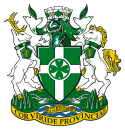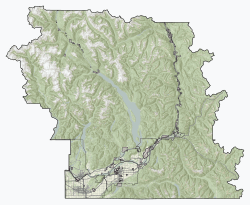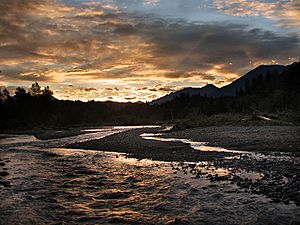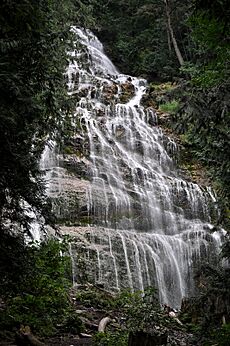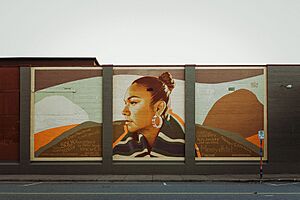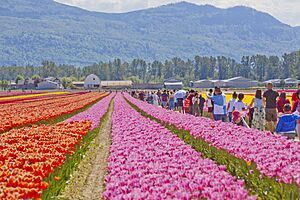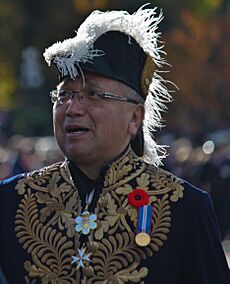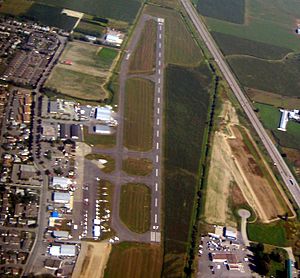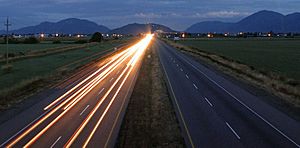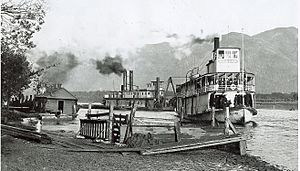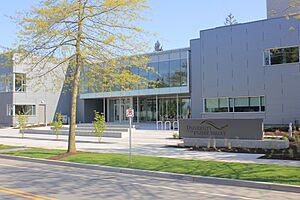Chilliwack facts for kids
Quick facts for kids
Chilliwack
|
|||||
|---|---|---|---|---|---|
| City of Chilliwack | |||||
|
|||||
| Nickname(s):
The Wack
|
|||||
| Motto(s):
"Cor Viride Provinciae" (Latin)
"The Green Heart of the Province" |
|||||
| Country | Canada | ||||
| Province | British Columbia | ||||
| Regional district | Fraser Valley | ||||
| Settled | c. 3,000 BCE | ||||
| Incorporated | 1873 | ||||
| Amalgamated | 1980 | ||||
| Area | |||||
| • City | 261.34 km2 (100.90 sq mi) | ||||
| Elevation | 10 m (30 ft) | ||||
| Population
(2021)
|
|||||
| • City | 93,203 | ||||
| • Density | 356.6/km2 (924/sq mi) | ||||
| • Metro | 113,767 | ||||
| • Metro density | 78.8/km2 (204/sq mi) | ||||
| Time zone | UTC−08:00 (PST) | ||||
| • Summer (DST) | UTC−07:00 (PDT) | ||||
| Forward sortation area |
V2P - V2R, V4Z
|
||||
| Area code(s) | 604, 778, 236, 672 | ||||
| Highways | |||||
| Waterways | Chilliwack River, Vedder River, Fraser River, Hope River | ||||
Chilliwack (pronounced CHIL-ə-wak) is a city in British Columbia, Canada. It's home to about 93,000 people and covers an area of 261 square kilometers (101 square miles). Chilliwack is located about 100 kilometers (60 miles) east of Vancouver in the beautiful Fraser Valley.
A large part of Chilliwack's land is protected for farming, and agriculture makes up about 30% of the local economy. The city is bordered by the Fraser River to the north and the Vedder River to the south. It's also surrounded by tall mountains like Mount Cheam and Slesse Mountain.
What's in a Name?
The name Chilliwack comes from the Halq'eméylem language, spoken by the Stó:lō people who live around Chilliwack. In their language, Tcil'Qe'uk means "valley of many streams." This name also inspired the Chilliwack River and the local Indigenous group, the Ts'elxwéyeqw people.
For a while, there were two different spellings: "Chilliwack" and "Chilliwhack." When the city and the township joined together, they decided to use the spelling "Chilliwack."
A Look Back in Time
People have lived in the Fraser Valley, or S'ólh Téméxw, for a very long time, going back 10,000 years! There are signs of permanent homes in the Chilliwack area from about 5,000 years ago. When the first Europeans arrived, it's thought that as many as 40,000 people lived in the Stó:lō territory.
The 1800s
In the mid-1800s, many gold miners passed through the area on their way to the goldfields of the upper Fraser River. By the 1860s, settlers had started farms along the Fraser River.
On April 26, 1873, the "Corporation of the Township of Chilliwhack" became one of the first towns to be officially recognized in British Columbia. Back then, the town center was by the Fraser River, and steamboats were the main way to travel and move goods.
Later, in 1881, the town center moved south to a place called "Five Corners." This new area was first named "Centreville," but people soon started calling it "Chilliwack." The area has experienced big floods in the past, including in 1894, 1948, and 2021.
The Early 1900s
On February 20, 1908, the part of the township known as Chilliwack became its own separate City of Chilliwack. So, for many years, the City of Chilliwack and the Township of Chilliwhack were two different places, even though they were right next to each other.
In 1910, a special electric railway started carrying passengers between New Westminster and Chilliwack.
During World War II, a military base called Camp Chilliwack was built in 1941. It was used to train soldiers and protect Canada's West Coast. Even after the war, it stayed open as a training center during the Cold War.
The Late 1900s
On January 1, 1980, the Township of Chilliwhack and the City of Chilliwack finally joined together to form one municipality called the District of Chilliwack. Then, in 1999, it was renamed the City of Chilliwack. Today, people often use "Chilliwack" to mean the whole city, the old city center, and the larger area around it.
In 1997, after the Cold War ended, CFB Chilliwack closed down. Its training buildings were turned into the Canada Education Park. This park is now a campus for several schools and training centers, including the Justice Institute of British Columbia and the University of the Fraser Valley. It also has a museum about military education.
Where is Chilliwack?
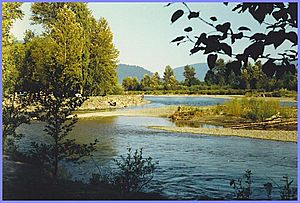
Chilliwack is located in the Upper Fraser Valley, about 100 kilometers (60 miles) east of Vancouver. It sits right on the Trans-Canada Highway. To the north, you'll find the Fraser River, and to the south, the border with the United States.
The city is surrounded by impressive mountains like Mount Cheam and Slesse Mountain, and large rivers such as the Fraser and Vedder.
Chilliwack's Landscape
Chilliwack is made up of several smaller villages and communities that have joined together over time. The main city area runs north to south, with the Trans-Canada Highway cutting through it.
The city's borders are the Fraser River to the north, the Eastern Hillsides to the east, the Canada–US border to the south, and the Vedder Canal to the west. Farming is still a very important part of Chilliwack, with many farms covering a large area of land.
Neighbourhoods
North Side Neighbourhoods
The north side of Chilliwack is sometimes called "Chilliwack Proper Village West." It stretches from the Trans-Canada Highway north to the Fraser River. This area includes communities like Camp River, Chilliwack Mountain, Downtown Chilliwack, and Rosedale.
Downtown Chilliwack is the historic heart of the city. Here you'll find places like the Chilliwack Coliseum, the Chilliwack Cultural Centre, and the city hall.
South Side Neighbourhoods
The south side of Chilliwack includes communities such as Cultus Lake Park, Greendale, Promontory Heights, and Sardis. Sardis is the main urban area on the south side and is a popular spot for shopping.
Parks
- Bridal Veil Falls Provincial Park
- Cheam Wetlands Regional Park
- Chilliwack Heritage Park
- Chilliwack Lake Provincial Park
- Cultus Lake Provincial Park
- Fairfield Park
- Great Blue Heron Nature Reserve
- Gwynne Vaughn Park
- Island 22
- Salish Park
- Sardis Park
- Townsend Park
Arts and Culture
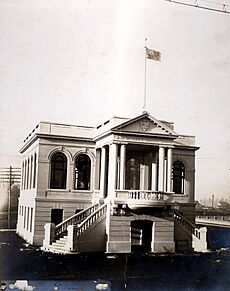
Music
Chilliwack has a lively music scene, especially with young ska and punk rock bands. Some bands from Chilliwack include These Kids Wear Crowns and Mystery Machine.
There's also a strong classical music community, with the Chilliwack Symphony Orchestra and the Chilliwack Metropolitan Orchestra. The drumline from Sardis Secondary School even performed at the 2010 Winter Olympics in Vancouver!
Performing Arts
The Chilliwack Cultural Centre is a great place to see shows in downtown Chilliwack. It's home to the Chilliwack Players' Guild, which is the local theatre company.
The Chilliwack School of Performing Arts offers training in acting, singing, and dancing for kids and teens. They put on a big show every January at the Chilliwack Cultural Centre.
Public Art
The Chilliwack Mural Festival happens every year. Many large, original artworks have been created in Historic Downtown Chilliwack thanks to this festival. You can find murals by Canadian artists like Emmanuel Jarus and Jason Botkin, and explore other public art on the Chilliwack Public Art Trail.
Festivals
Chilliwack hosts many fun events and festivals throughout the year, including:
- Christmas Craft Market
- Art of Wine Festival
- Fraser Valley Culture and Craft Beer Festival
- Party in the Park
- Canada Day
- Mural Festival
- Pride Festival
- Yarrow Days
- Garlic Festival
- Tulip Festival
- Sunflower Festival
- Chilliwack Independent Film Festival
- Music and Dance Festival
- Chilliwack Fair
- Chilliwack Flight Fest
- Lunar New Year
Museums
- Chilliwack Sports Hall of Fame
- Canadian Military Education Centre
- Chilliwack Museum and Archives: This museum is located in the old Chilliwack City Hall building from 1912, which is a National Historic Site. It's run by the Chilliwack Museum and Historical Society, which started in 1958.
Famous People from Chilliwack
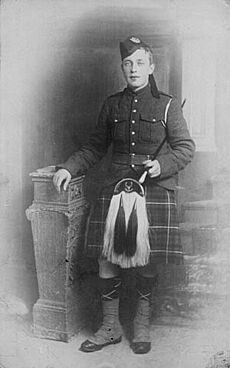
- Academics
- Allan Brooks DSO, a bird expert and wildlife artist
- Carin Bondar Ph.D., a biologist, writer, and TV personality
- Charlotte Froese Fischer, Ph.D., a mathematician and computer scientist
- Homer Thompson Ph.D., a classical archeologist who excavated the Ancient Agora of Athens
- Rita Steblin Ph.D., a music historian
- Wayne Smith M.Econ, a former Chief Statistician of Canada
- Activists
- Betty Fox, an activist for cancer research and mother of Terry Fox.
- Michael J. Fox OC, a famous actor
- Athletes
- Amber Allen, a former professional soccer player
- Dave Archibald, a former professional hockey player
- Jordyn Huitema, a soccer player for Seattle Reign FC and the Canadian national team
- Marc-Andre Leclerc, a solo free climber
- Rick Klassen, a former professional football player
- Arts and entertainment
- Bernie Herms, a Grammy Award-winning artist
- Bob Random, an actor
- Bria Skonberg, a jazz musician and Juno Award winner
- Inez Jasper, a musician
- Jim Vallance CM, a musician, songwriter, and producer
- Patrick Gallagher, an actor from shows like Glee
- Tasha Tilberg, a model
- Journalists
- Diana Swain, a television journalist
- Jack McGaw, a journalist and radio operator
- Jurists
- Steven Point KC, OC, OBC, a former Lieutenant-Governor of British Columbia
- Thomas J. Crabtree KC, a Supreme Court Justice
- William H. Davies KC, a Supreme Court Justice
- Military
- Piper James C. Richardson, who received the Victoria Cross for bravery
- Mark Isfeld, a combat engineer and UN peacekeeper
- Politicians
- Barry Penner KC, MLABC, a former Attorney General
- Chuck Strahl PC, a former cabinet minister
- Dorothy Kostrzewa, a former city councillor and the first Chinese-Canadian woman elected to political office in Canada
- Writers
- Allan Fotheringham, a columnist
- Gayle Friesen, a novelist
- W.P. Kinsella OC, OBC, author of Shoeless Joe
- Others
- Brian Minter CM, OBC - a gardener, author, and columnist
- Prest Family - One of the first families to settle in Chilliwack
Media
Newspapers
- Chilliwack Progress - This is British Columbia's oldest community newspaper, published since April 1891.
Radio
- FM 89.5 - CHWK-FM
- FM 91.7 - CBYF-FM
- FM 98.3 - CKSR-FM
- FM 99.9 - CBU-FM-7
- FM 102.1 - CBUF-FM-1
- FM 107.5 - CKKS-FM
Television
- Channel 11 CHAN-TV-1 Global
Sports
| Team | League | Sport | Venue | Established |
|---|---|---|---|---|
| Chilliwack Chiefs | BCHL | Ice hockey | Chilliwack Coliseum | 2011 |
| Chilliwack Jets | PJHL | Ice hockey | Sardis Sports Complex | 2020 |
| Valley Huskers | CJFL | Football | Exhibition Stadium | 1999 |
| Chilliwack Crusaders RFC | Third Division | Rugby union | Yarrow Sports Field | 2012 |
Ice Hockey
Chilliwack has two junior ice hockey teams. The Chilliwack Chiefs play their games at the Chilliwack Coliseum. The Chilliwack Jets play at the Sardis Ice Complex. The Chilliwack Minor Hockey Association, which helps young players, started in 1958.
Football
The Valley Huskers, a Canadian Junior Football League team, play their home games at Exhibition Stadium.
Fun Sports Facts
- The Chilliwack Turbo Fastball club won the Canadian Jr. Men's National Championships in 1997.
- Chilliwack's minor baseball Cougars won the Provincial Championship in 2016, 2017, and 2019.
- The Sardis Flyers are a speed skating club.
- The Chilliwack Hawks Field Lacrosse team plays at Stitos Elementary and Middle School.
- The Chilliwack Minor Lacrosse Mustangs are a minor league lacrosse team.
Climate
Chilliwack has a mild oceanic climate, which means it has cool, wet winters and warm, dry summers. This climate is great for growing many different crops.
The highest temperature ever recorded in Chilliwack was 43.7°C (110.7°F) on June 28, 2021, during a big heat wave. The lowest temperature was -21.7°C (-7.1°F) on December 27, 1968. Most of the time, snow only falls in the surrounding mountains, but Chilliwack usually gets snow for two or three weeks in December or January.
Even though some reports have said Chilliwack is the warmest city in Canada, Victoria actually has a slightly warmer average temperature. However, Chilliwack does have some of the warmest average high temperatures in Canada.
Chilliwack gets a similar amount of rainy days as other nearby cities. Summers are usually sunny and warm, with long days where it stays light until late in the evening. Sometimes, temperatures can even go above 30°C (86°F).
Chilliwack also has very good air quality, ranking among the best in the world for clean air.
| Climate data for Chilliwack Airport - Cultus Lake, British Columbia | |||||||||||||
|---|---|---|---|---|---|---|---|---|---|---|---|---|---|
| Month | Jan | Feb | Mar | Apr | May | Jun | Jul | Aug | Sep | Oct | Nov | Dec | Year |
| Record high °C (°F) | 18.3 (64.9) |
20.6 (69.1) |
25.8 (78.4) |
32.2 (90.0) |
34.5 (94.1) |
43.7 (110.7) |
38.0 (100.4) |
38.2 (100.8) |
36.5 (97.7) |
27.8 (82.0) |
21.1 (70.0) |
19.0 (66.2) |
43.7 (110.7) |
| Mean daily maximum °C (°F) | 6.1 (43.0) |
8.8 (47.8) |
11.8 (53.2) |
15.8 (60.4) |
19.1 (66.4) |
21.7 (71.1) |
25.0 (77.0) |
25.3 (77.5) |
22.3 (72.1) |
15.3 (59.5) |
9.3 (48.7) |
6.0 (42.8) |
15.5 (59.9) |
| Daily mean °C (°F) | 3.3 (37.9) |
4.9 (40.8) |
7.3 (45.1) |
10.5 (50.9) |
13.7 (56.7) |
16.4 (61.5) |
18.8 (65.8) |
18.7 (65.7) |
15.7 (60.3) |
10.8 (51.4) |
6.2 (43.2) |
3.3 (37.9) |
10.8 (51.4) |
| Mean daily minimum °C (°F) | 0.4 (32.7) |
1.0 (33.8) |
2.8 (37.0) |
5.2 (41.4) |
8.2 (46.8) |
11.0 (51.8) |
12.5 (54.5) |
12.1 (53.8) |
9.1 (48.4) |
6.4 (43.5) |
3.1 (37.6) |
0.5 (32.9) |
6.0 (42.8) |
| Record low °C (°F) | −20.6 (−5.1) |
−16.7 (1.9) |
−14.4 (6.1) |
−6.1 (21.0) |
−1.7 (28.9) |
1.1 (34.0) |
3.3 (37.9) |
2.8 (37.0) |
−2.8 (27.0) |
−7.2 (19.0) |
−14.4 (6.1) |
−21.7 (−7.1) |
−21.7 (−7.1) |
| Average precipitation mm (inches) | 233.5 (9.19) |
125.8 (4.95) |
154.7 (6.09) |
116.3 (4.58) |
93.1 (3.67) |
91.7 (3.61) |
48.1 (1.89) |
56.7 (2.23) |
75.2 (2.96) |
178.5 (7.03) |
283.8 (11.17) |
210.1 (8.27) |
1,667.5 (65.65) |
| Average rainfall mm (inches) | 206.9 (8.15) |
114.7 (4.52) |
143.7 (5.66) |
115.2 (4.54) |
93.1 (3.67) |
91.7 (3.61) |
48.1 (1.89) |
56.7 (2.23) |
75.2 (2.96) |
178.4 (7.02) |
272.7 (10.74) |
185.8 (7.31) |
1,582.2 (62.29) |
| Average snowfall cm (inches) | 26.6 (10.5) |
11.2 (4.4) |
11.0 (4.3) |
1.1 (0.4) |
0.0 (0.0) |
0.0 (0.0) |
0.0 (0.0) |
0.0 (0.0) |
0.0 (0.0) |
0.1 (0.0) |
11.2 (4.4) |
24.3 (9.6) |
85.3 (33.6) |
| Average precipitation days (≥ 0.2 mm) | 20.6 | 15.9 | 19.7 | 17.5 | 15.8 | 14.6 | 8.7 | 8.5 | 9.9 | 17.1 | 21.5 | 20.1 | 189.9 |
| Average rainy days (≥ 0.2 mm) | 18.6 | 14.6 | 19.2 | 17.5 | 15.8 | 14.6 | 8.7 | 8.5 | 9.9 | 17.1 | 20.9 | 18.4 | 183.8 |
| Average snowy days (≥ 0.2 cm) | 5.0 | 2.9 | 1.9 | 0.2 | 0.0 | 0.0 | 0.0 | 0.0 | 0.0 | 0.1 | 2.0 | 4.8 | 16.8 |
| Source: Environment Canada | |||||||||||||
People and Cultures
Population
In 2021, the Chilliwack area had a population of about 113,767 people. The City of Chilliwack itself had 93,203 residents.
Different Backgrounds
Chilliwack is home to people from many different backgrounds. Here's a look at the main groups:
| Panethnic group |
2021 | 2016 | 2011 | 2006 | 2001 | |||||
|---|---|---|---|---|---|---|---|---|---|---|
| Pop. | % | Pop. | % | Pop. | % | Pop. | % | Pop. | % | |
| European | 73,865 | 80.3% | 69,810 | 84.92% | 67,210 | 87.37% | 62,205 | 90.59% | 57,020 | 91.52% |
| Indigenous | 7,255 | 7.89% | 6,585 | 8.01% | 6,030 | 7.84% | 3,400 | 4.95% | 2,550 | 4.09% |
| South Asian | 3,025 | 3.29% | 1,260 | 1.53% | 715 | 0.93% | 555 | 0.81% | 465 | 0.75% |
| Southeast Asian | 2,425 | 2.64% | 1,250 | 1.52% | 855 | 1.11% | 340 | 0.5% | 580 | 0.93% |
| East Asian | 2,215 | 2.41% | 1,580 | 1.92% | 1,100 | 1.43% | 1,070 | 1.56% | 910 | 1.46% |
| Latin American | 1,015 | 1.1% | 500 | 0.61% | 370 | 0.48% | 475 | 0.69% | 295 | 0.47% |
| African | 1,005 | 1.09% | 685 | 0.83% | 325 | 0.42% | 250 | 0.36% | 270 | 0.43% |
| Middle Eastern | 510 | 0.55% | 200 | 0.24% | 75 | 0.1% | 110 | 0.16% | 65 | 0.1% |
| Other | 675 | 0.73% | 345 | 0.42% | 245 | 0.32% | 260 | 0.38% | 150 | 0.24% |
| Total responses | 91,985 | 98.69% | 82,210 | 98.12% | 76,930 | 98.71% | 68,670 | 99.21% | 62,300 | 99% |
| Total population | 93,203 | 100% | 83,788 | 100% | 77,936 | 100% | 69,217 | 100% | 62,927 | 100% |
Religions
In 2021, almost half of Chilliwack's residents (49.4%) said they had no religion. About 45.5% of people identified as Christian. Other religions practiced in Chilliwack include Sikhism (1.7%), Islam (0.8%), Buddhism (0.6%), and Hinduism (0.6%).
Economy
Chilliwack is part of the Lower Mainland-Southwest economic area. Services and retail (shops) make up about half of Chilliwack's economy. Other important industries include manufacturing (13%), construction (8%), and agriculture and forestry (5%).
| Industry | Est. % of GDP |
|---|---|
| Agriculture & Forestry | 5% |
| Construction | 8% |
| Education | 6% |
| Finance, Insurance & Real Estate | 11% |
| Health | 6% |
| Manufacturing | 13% |
| Public Administration | 9% |
| Retail/Wholesale Trade | 12% |
| Technology | 6% |
| Tourism | 9% |
| Other | 15% |
Getting Around Chilliwack
Airports
Vancouver International Airport is about 113 km (70 miles) from Chilliwack. It has flights to places all over the world. Abbotsford International Airport is closer, about 42 km (26 miles) west, and offers flights to other Canadian cities.
Chilliwack Airport is a smaller airport right in downtown Chilliwack. It's mainly used for pilot training and fun recreational flights.
Walking and Biking Paths
Chilliwack has 673 km (418 miles) of paths for walking and biking. This is more per person than any other city in the Lower Mainland area!
Highways
The Trans-Canada Highway (Highway 1) runs through Chilliwack. It's a major highway that connects many parts of Canada.
Highway 9 is another important road in eastern Chilliwack. It connects to Highway 1 and is the main way to get to Harrison Hot Springs.
Public Transit
The Chilliwack Transit System has 9 buses that travel on regular routes throughout the city.
Passenger Trains
In the past, Chilliwack had a passenger train service called the British Columbia Electric Railway. This service stopped in 1950. There are now ideas to bring back a light-rail train service using the old railway path.
Learning in Chilliwack
Colleges and Universities
Canada Education Park is a large campus in Chilliwack that has several colleges and training centers. These include the University of the Fraser Valley (UFV), the RCMP Pacific Region Training Centre, and the Justice Institute of British Columbia.
The University of the Fraser Valley (UFV) is the biggest college in Chilliwack. It offers many different programs, from master's degrees to certificates, in subjects like arts, science, business, and nursing. UFV has campuses in Chilliwack, Abbotsford, Hope, and Mission.
Private Schools
| School | Level | Grades |
|---|---|---|
| Saint Mary's | Elementary | K-7 |
| Unity Christian School | Elementary-Secondary | K-12 |
| John Calvin School | Elementary | K-7 |
| Timothy Christian School | Elementary-Secondary | K-12 |
| Highroad Academy | Elementary-Secondary | K-12 |
| Mount Cheam Christian School | Elementary-Secondary | K-12 |
| Chilliwack Adventist Christian School | Elementary-Junior secondary | K-7 |
| Cascade Christian School | Elementary-Junior secondary | K-12 |
Public Schools
| School | Level | Grades |
|---|---|---|
| Bernard Elementary | Elementary | K-5 |
| Central Elementary Community School | Elementary | K-5 |
| Cheam Elementary | Elementary | K-5 |
| Cultus Lake Elementary | Elementary | K-5 |
| East Chilliwack Elementary | Elementary | K-5 |
| Evans Elementary | Elementary | K-5 |
| F.G. Leary Fine Arts Elementary | Elementary | K-5 |
| Greendale Community Elementary | Elementary | K-5 |
| Little Mountain Elementary | Elementary | K-5 |
| McCammon Traditional Elementary | Elementary | K-5 |
| Promontory Heights Elementary | Elementary | K-5 |
| Robertson Elementary | Elementary | K-5 |
| Rosedale Traditional Community | Elementary, Middle | K-8 |
| Sardis Elementary | Elementary | K-5 |
| Stitó:s Lá:lém Totí:lt | Elementary, Middle | K-8 |
| Strathcona Elementary | Elementary | K-5 |
| Tyson Elementary | Elementary | K-5 |
| Unsworth Elementary | Elementary | K-5 |
| Vedder Elementary | Elementary | K-5 |
| Watson Elementary | Elementary | K-5 |
| Yarrow Community Elementary | Elementary | K-5 |
| A.D. Rundle Middle | Middle | 6-8 |
| Chilliwack Middle | Middle | 6-8 |
| Mt. Slesse Middle | Middle | 6-8 |
| Rosedale Traditional Community | Middle | 6-8 |
| Vedder Middle | Middle | 6-8 |
| Chilliwack Secondary | Secondary | 9-12 |
| G.W. Graham Secondary | Secondary | 9-12 |
| Imagine High Integrated Arts and Technology Secondary | Secondary | 9-12 |
| Sardis Secondary | Secondary | 9-12 |
| Education Centre | Alternative | 8-12 |
| Fraser Valley Distance Education | Alternative | K-12 |
The Conseil scolaire francophone de la Colombie-Britannique runs one French-language primary school called école La Vérendrye.



